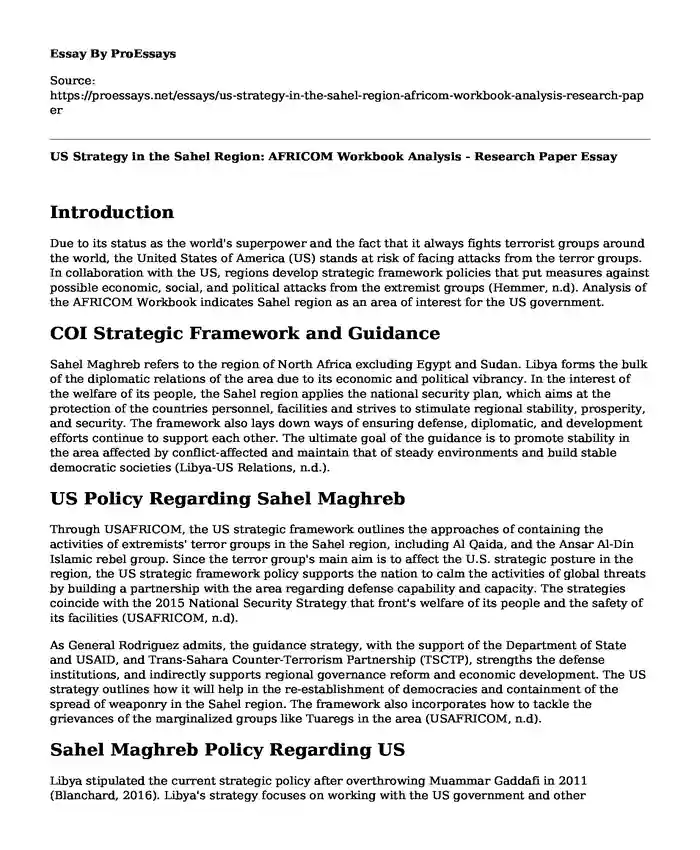Introduction
Due to its status as the world's superpower and the fact that it always fights terrorist groups around the world, the United States of America (US) stands at risk of facing attacks from the terror groups. In collaboration with the US, regions develop strategic framework policies that put measures against possible economic, social, and political attacks from the extremist groups (Hemmer, n.d). Analysis of the AFRICOM Workbook indicates Sahel region as an area of interest for the US government.
COI Strategic Framework and Guidance
Sahel Maghreb refers to the region of North Africa excluding Egypt and Sudan. Libya forms the bulk of the diplomatic relations of the area due to its economic and political vibrancy. In the interest of the welfare of its people, the Sahel region applies the national security plan, which aims at the protection of the countries personnel, facilities and strives to stimulate regional stability, prosperity, and security. The framework also lays down ways of ensuring defense, diplomatic, and development efforts continue to support each other. The ultimate goal of the guidance is to promote stability in the area affected by conflict-affected and maintain that of steady environments and build stable democratic societies (Libya-US Relations, n.d.).
US Policy Regarding Sahel Maghreb
Through USAFRICOM, the US strategic framework outlines the approaches of containing the activities of extremists' terror groups in the Sahel region, including Al Qaida, and the Ansar Al-Din Islamic rebel group. Since the terror group's main aim is to affect the U.S. strategic posture in the region, the US strategic framework policy supports the nation to calm the activities of global threats by building a partnership with the area regarding defense capability and capacity. The strategies coincide with the 2015 National Security Strategy that front's welfare of its people and the safety of its facilities (USAFRICOM, n.d).
As General Rodriguez admits, the guidance strategy, with the support of the Department of State and USAID, and Trans-Sahara Counter-Terrorism Partnership (TSCTP), strengths the defense institutions, and indirectly supports regional governance reform and economic development. The US strategy outlines how it will help in the re-establishment of democracies and containment of the spread of weaponry in the Sahel region. The framework also incorporates how to tackle the grievances of the marginalized groups like Tuaregs in the area (USAFRICOM, n.d).
Sahel Maghreb Policy Regarding US
Libya stipulated the current strategic policy after overthrowing Muammar Gaddafi in 2011 (Blanchard, 2016). Libya's strategy focuses on working with the US government and other international organizations to ensure they install capacity within Libya's government institutions, improve civil societies, and introduce free and fair elections. The region welcomes the U.S. projects through the directions by the United Nations mission of supporting Libya (Libya-US Relations, n.d.).
The framework welcomes U.S. assistance that helps strengthen its national security institutions through a measured scale. Through this provision, the structure helps protect civilians and promote regional stability. The strategy also allows the U.S. to set its business centers like the oil companies. As a result, the US oil distribution companies now sit and operate from Libya's soil. The framework also allows the U.S. to establish trade and investment agreement with the collective market organizations in the region (Hemmer, n.d).
Strategic framework and guidance policy is an essential tool for a country to achieve its development goals. Due to international relations, the Sahel region, Libya taking its representation, sets develops framework the policies take concern of how the area associated with other countries, especially the US. The US also sets its system to accommodate and integrate with the already set framework of the nation due to its interest in the affairs of the Sahel region,
References
Blanchard, C. M. (2016). Libya: Transition and US policy (No. CRS-RL33142). Congressional Research Service, Washington United States. Retrieved December 15, 2019, from https://apps.dtic.mil/docs/citations/AD1017815
Hemmer, C., Hemmer, International Security Studies, Air War College, & Air War College. (n.d.). U.S. Policy towards North Africa: Three Overarching Themes. Retrieved December 15, 2019, from https://mepc.org/journal/us-policy-towards-north-africa-three-overarching-themes.
Libya-US Relations. (n.d.). Retrieved December 15, 2019, from https://www.embassyoflibyadc.org/about-libya/libya-us-relations/.
USAFRICOM, "Regional, Culture, and Language Familiarization."
Cite this page
US Strategy in the Sahel Region: AFRICOM Workbook Analysis - Research Paper. (2023, Mar 20). Retrieved from https://proessays.net/essays/us-strategy-in-the-sahel-region-africom-workbook-analysis-research-paper
If you are the original author of this essay and no longer wish to have it published on the ProEssays website, please click below to request its removal:
- Government Regulation Is Necessary To Limit Excessive CEO Compensation In The UK - Paper Example
- Theories and Models of Public Policy Essay
- Policing and Crime Essay Example
- Essay Sample on Rising Federal Deficit and National Debt
- Essay Sample on Trump Proposes Ban on Flavored E-Cigarette Sales to Teens
- Essay on Trump's Quest to Restore America's Greatness: 2018 Trade & Manufacturing Policy
- Effectiveness of NRF & NIMS in Disaster Response - Essay Sample







